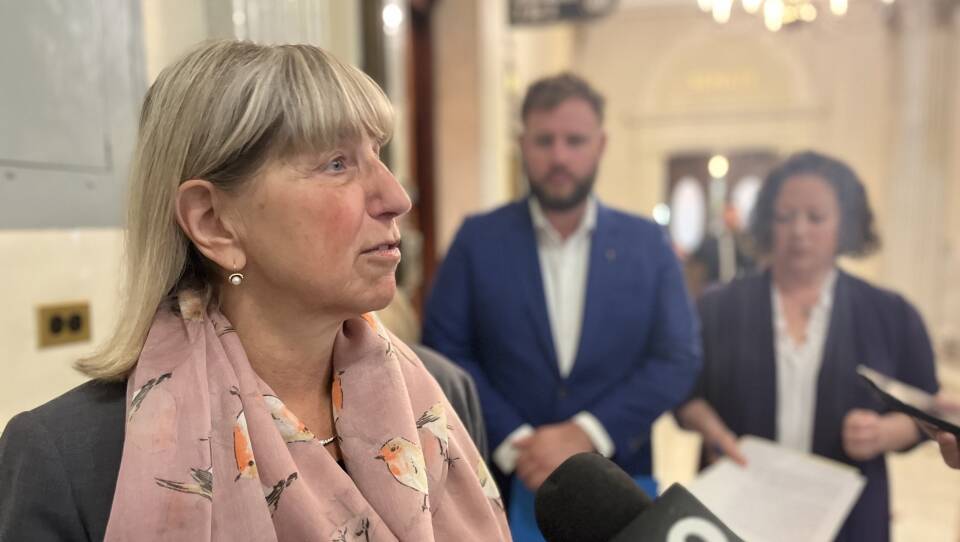A $61 billion state budget passed the Massachusetts Senate on a 38-2 vote Thursday night, setting the stage for a round of legislative dealmaking that will chart the state’s course on liquor licensing, transportation funding, vocational schools and more.
The Senate budget and the version the House passed in April have similar bottom lines – both would raise state spending more than 6% over the current budget – but differ in the specifics of how they allocate some of that money.
Lawmakers in each chamber also wove their distinct policy priorities into the bills, including measures designed to help the state navigate tariff uncertainty and other federal shifts.
Here’s a look at some of the areas where they’ll need to find common ground:
Liquor licenses
Senators adopted a budget amendment from Ludlow Democrat Sen. Jake Oliveira that would reform how liquor licenses are issued, taking the Legislature out of the process.
Local governments need Beacon Hill’s permission to issue more liquor licenses once they’ve hit a certain cap, a process that can take months or longer and leave prospective business owners in suspense. Oliveira’s plan, which the Senate approved Thursday, would let cities and towns decide how many licenses they want to give out.
“Our current process was born out of the process of the repeal of Prohibition with the 21st Amendment nearly a hundred years ago,” Oliveira said. “Certainly our economy has changed since then.”
The House budget does not speak to changing liquor licensing. The Senate could have an ally in the governor’s office on this issue – Gov. Maura Healey proposed similar changes at one point last session.
Vocational school admissions
New state regulations requiring lottery-style admissions at vocational-technical high schools in Massachusetts are set to take effect this fall, after years of discussion. It’s a move supporters say will open up new pathways for students of color, those from low-income families, English learners and students with disabilities. Critics balk at the idea of no longer considering applicants’ middle-school grades.
Language in the House budget would put the new regulations on pause, while a new state task force studies voc-tech admissions data and policies.
The Senate opted to leave vocational school admissions policy out of its budget, rejecting related amendments. If the House language is dropped from the final compromise budget, the regulations approved this week by the Department of Elementary and Secondary Education would stand.
Transportation funding
The House and Senate are at odds on how much to spend on the MBTA as the transit system works to improve the rider experience while bracing for its own budget woes.
Leaders of the Senate believe the $500 million they’ve included for the T is enough. The House wants to go bigger, with nearly $700 million.
Top Democrats in the House describe the T as an economic engine and say now is a good time to invest in it. They point to cultural changes and greater reliability under Healey’s general manager Phil Eng. But the Senate favors what Senate President Karen Spilka describes as a “regional equity” approach, highlighting investments that touch areas outside of Greater Boston.
Tariff response
Both versions of the spending bill propose steps to help ease some of the impacts of tariffs that may be implemented.
The Senate looks at the potential for tariffs to drive up the prices of construction materials like Canadian lumber, exacerbating the state’s housing cost crisis. Senators unanimously backed an amendment directing the state to explore the feasibility of removing the sales tax from building materials used for multi-family housing projects whose progress has been stalled by tariffs.
Sen. Julian Cyr, a Truro Democrat who sponsored the amendment, said the study would give “the Legislature sort of a menu around how this would work” to inform future deliberations about targeting a sales-tax credit.
The House comes at the issue from the small business side. A section in the House bill would create a new state office of a small business ombudsperson, to help entrepreneurs who are “experiencing hardship while navigating complex federal policies that may hinder growth.” The ombudsperson would also broadly serve as a resource for small businesses across Massachusetts.
The House and Senate will next appoint a team of six negotiators to reconcile the differences between their two bills. Their aim will be to have a finalized state budget in place when the new fiscal year dawns on July 1, but late budgets have become tradition in Massachusetts and that goal hasn’t been met since 2010.
Looming over the process this year is the potential for significant federal funding cuts that could force budget-writers to rethink how much they can spend and where.
Healey and lawmakers built their spending plans with the expectation that Massachusetts would receive around $16 billion in federal reimbursements, but at this point they remain unsure how much money will ultimately materialize.
“We will deal with the facts once we know the facts, and we’re prepared to deal with them in a responsible manner,” Senate budget chief Michael Rodrigues, a Westport Democrat, told reporters Thursday morning.
Rodrigues acknowledged that the negotiating team he’ll lead with House budget chief Aaron Michlewitz, a Democrat from Boston’s North End, could need to change their revenue estimates during the course of their talks.





